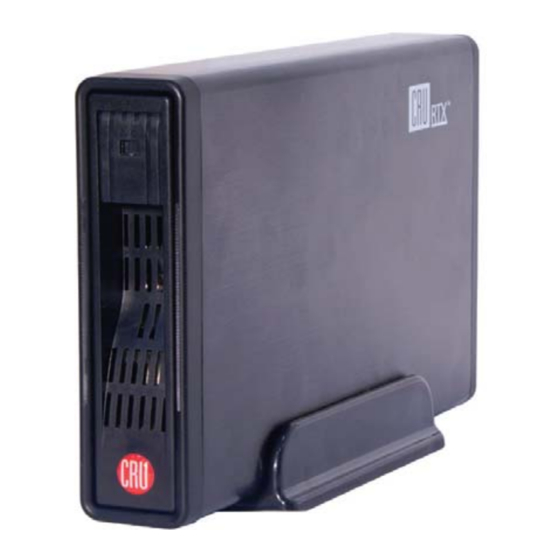CRU Dataport RTX 100-3Q Manuel de l'utilisateur - Page 7
Parcourez en ligne ou téléchargez le pdf Manuel de l'utilisateur pour {nom_de_la_catégorie} CRU Dataport RTX 100-3Q. CRU Dataport RTX 100-3Q 9 pages.
Également pour CRU Dataport RTX 100-3Q : Manuel de démarrage rapide (2 pages)

CRU
4. Warnings and Notices
• If your drive is inserted incorrectly it may cause damage to the internal connections.
Be sure to only insert 3.5" SATA drives and to insert them properly. Do not eject the
drive while it is being accessed. Data loss could result.
• RTX100-3Q is made of aluminum to help with cooling. Although it can be used lying
flat, we recommend that you position it vertically on its stand to aid heat dissipation.
1000GB+ drives get hotter than smaller capacity drives, so the usage of additional
external cooling (such as a fan) is recommended.
• Do not move RTX while the drive has power.
• Although a drive can be accessed without locking the ejection handle, locking is
recommended to keep from accidentally ejecting a drive while in use. Use caution
when pulling on the ejection handle so that if it is locked you do not break the
handle.
5. Frequently Asked Questions
Q: Can you tell me why my eSATA device appears as a Parallel SCSI device in System
Profiler?
A: The "Serial ATA" tab in System Profile shows devices attached to the internal SATA
bus, but not always devices attached to an eSATA host card. Sometimes these devices
will appear under the heading "Parallel SCSI" instead. This is entirely normal and does
not indicate a problem with the device or its drivers.
Q: Why is my hard drive experiencing data corruption?
A: Many things can cause data corruption on hard drives, whether they are inside your
computer or inside an external storage product. Malicious software, OS bugs, failure to
properly disconnect external devices, or no reason at all. Data corruption or loss is
therefore not covered by warranty (this is the case with all rational companies in the
storage industry).
The first thing to try is restarting both the computer and the external device. If the data is
still corrupted, try running built-in OS utilities (such as Mac OS X's Disk Utility First Aid)
on the hard drive. For best results, boot your computer with a Mac OS X Installation CD,
and launch Disk Utility from the CD. When you reach the Mac OS Installation program,
you can run Disk Utility from one of the menus at the top of the screen. From Disk
Utility, you can run "Verify Disk" and "Repair Disk" to find and fix any errors that may be
present in your Mac OS installation.
If the OS utility doesn't help, you may need Data Rescue. This is a great solution for
recovering lost data from a hard drive which has suffered data loss or corruption. If
there is a true hardware failure of your hard drive that prevents it from communicating
with your computer, there is no software solution in existence that can fix this problem.
However, since we cannot tell you with any certainty whether or not you are
R T X 1 0 0 - 3 Q U s e r M a n u a l A 9 - 1 0 0 - 0 0 0 6 R E V 1 . 0
- 7 -
